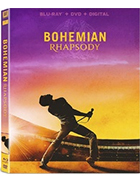Bohemian Rhapsody
|  Bohemian Rhapsody, a biopic of indelible Queen frontman Freddie Mercury, begins and ends with the band’s legendary performance at the Live Aid benefit concert in Wembley Stadium in 1985. As the opening credits roll, we follow closely behind Mercury as he makes his way to the stadium, the anticipation building as he walks up the ramp to the stage, jumping up and down to stay loose, and then the curtain pulls back and we see from his perspective the enormity of the crowd, a literal sea of people cheering, at which point we cut back to 1970, when Mercury was in his early 20s, working as a baggage handler at Heathrow Airport. Thus, the promise of that legendary performance—seeing it recreated in all its vast, energetic glory—becomes the film’s promise, the point to which we long to get. And that is something of a problem for the film, because as it unspools, it becomes clear that Bohemian Rhapsody is that most conventional of biopics, the kind that moves smoothly and efficiently from one greatest hits moment to the next—in this case, literally, as many of the film’s narrative shifts pivot on the creation of a Queen hit, whether it be the genre-defying “Bohemian Rhapsody,” the propulsive “Another One Bites the Dust,” or the audience-engaging “We Will Rock You.” The film skips over his childhood and begins with Mercury (Rami Malek) living in London with his Farsi parents, doting mother Jer (Meneka Das) and sternly disapproving father Bomi (Ace Bhatti). Shy but ambitious, he connects with the members of a struggling college pub band—guitarist Brian May (Gwilym Lee) and drummer Roger Taylor (Ben Hardy)—at the opportune moment when their lead singer abandons them for greener pastures (they later add a bass player, John Deacon, played by Joe Mazzello). There is a great deal of talk about how the newly formed band is a “family,” and while there are moments of genuine connection among them, they are too scattered to truly invoke that ethos. Their interactions are formed primarily around their musical creation, and we see some spats and disagreements (most amusingly over the Taylor-penned song “I’m in Love With My Car”), but it doesn’t convey the essence of depth to which the film truly aspires. Instead, we see four seemingly dissimilar musician-outcasts finding common ground in their willingness to experiment, break the rules, and otherwise bend popular music to their own ambitions. Along the way we get a traditional rising arc, as they go from the anonymous London pub scene to being nationally televised on the BBC, which initiates their enormous rise in popularity and wealth, along with the attendant vices and moral failures, all of which belong to Mercury. The other band members are mostly accepting, understanding, and, even when angered, quick to forgive (they even step out early from one of Mercury’s ragers). It is Mercury who rides the ups and downs, much of which involves his conflicted sexuality. Although he loved and was genuinely devoted to his girlfriend Mary Austin (Lucy Boynton), he could not deny his homosexuality and soon found himself involved with music executive Paul Prenter (Allen Leech), who guides him into personal and sexual liberation, but then becomes a viper intent on using Mercury’s fame and wealth to pad his own lifestyle. The film gives us fleeting images and montages that suggest the extent and depth of Mercury’s sexual antics, but it is all done within safe PG-13 confines. More direct is the depiction of Mercury’s ego, which Rami Malek plays with great conviction that is matched only by his sense of desperation and loneliness when he’s out of the spotlight (some of the film’s best moments are the subtle ones, such as when Mercury meets Mary’s new boyfriend and is struck by a clearly alien feeling: jealousy). Mercury clashes at various points with everyone around him, particularly (fictional) AMI music executive Ray Foster, who is played in a bit of distracting stunt casting by Mike Myers, who 26 years ago helped put “Bohemian Rhapsody” back on the charts with a hilarious sequence in which a group of blissed out teenagers jam to it while driving in Wayne’s World (1992) (the movie even gives Foster a bit of meta-dialogue in which he complains that the song doesn’t offer kids the chance to do exactly what Wayne and Garth and their buddies do in Wayne’s World). If you are predisposed to view Queen as a band of true musical genius who defied all the rules in crafting their unique blend of hard rock, pop, and operatic grandeur, watching the dramatization of the genesis of their most famous songs certainly has an indelible kick. But, you can’t help but wish that writer Anthony McCarten, whose last two screenplays were biopics of physicist Stephen Hawking (2014’s The Theory of Everything) and British prime minister Winston Churchill (2017’s Darkest Hour), and director Bryan Singer, helming his first non-X-Men movie since 2013’s disastrous Jack the Giant Slayer, had come up with a cinematic structure more in keeping with Queen’s unique, outlandish tenor. Singer offers little in the way of aesthetic innovation or daring, instead sticking closely to a classical style whose minor ruptures (’70s-fab disco text flying out of the screen, for example, or a jittery, blurry news conference) only serve to underscore how unremarkable the rest of it is. Oliver Stone achieved exactly such a match of subject and style with The Doors (1991), which felt as energetic, unexpected, fiery, dangerous, and doomed as Jim Morrison was in real life. Bohemian Rhapsody, unfortunately, feels too safe for its own good, which is confirmed once we return to Wembley Stadium at the end and the movie essentially recreates Queen’s legendary 20-minute set. The film becomes all about recreation, rather than exploration, which means you’re better off just looking up the original Live Aid footage.
Copyright © 2019 James Kendrick Thoughts? E-mail James Kendrick All images copyright © 20th Century Fox Home Entertainment | |||||||||||||||||||||||||||||
Overall Rating: 

 (2.5)
(2.5)


